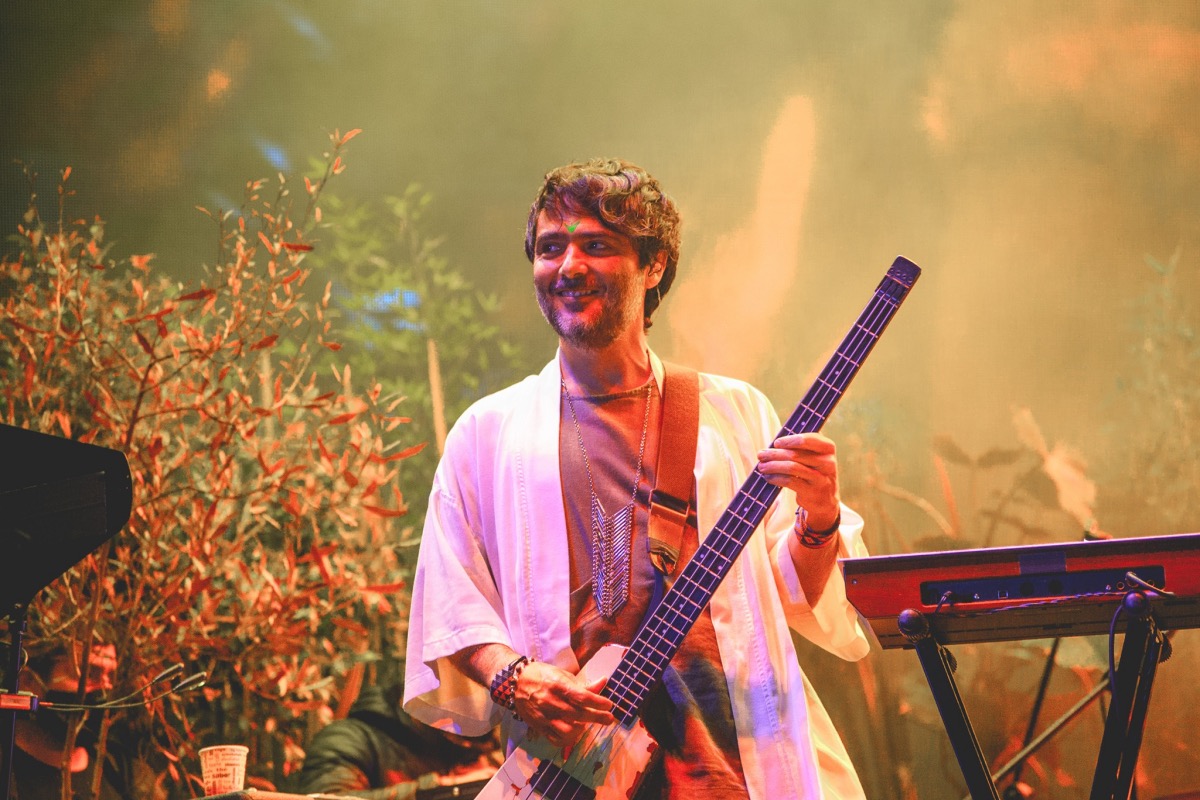Simón Mejía’s zodiac is Cancer —his birthday was just a few days ago— and while he says he doesn’t pay too much attention to horoscopes, he does feel he has a lot in common with his astral animal.
“I totally have the personality of the crab,” says the Bomba Estéreo founder and band leader, moving his hands like pincers. “It goes out, looks, and if it sees any kind of threat, it goes back in. When there is a full moon, it changes me—I feel its influence.”
If you think about the music that this Bogotá-born musician has created with Bomba Estéreo for almost 20 years, the water sign makes sense. The band’s signature sound came from drowning electronic beats in waves of champeta, cumbia, and bullerengue, music that originated near Colombia’s Caribbean shore. Monte, Mejía’s solo project, now drinks from the Pacific Ocean, exploring the sound and myth of marimba.
About Bomba Estéreo’s legacy, Mejía says he is proud of being part of a Colombian generation of artists like Choc Quib Town, Systema Solar, and Pernett that helped paved the way for alternative music in his country to thrive and have international notoriety.
“When we started, it was not easy in Colombia to have a musical career if you didn’t do vallenato, salsa, or reggaeton,” he said. “We had to open the road with a machete. Today it is still difficult, but at least there is a way.”
He also thinks that along with Santa Marta-born Li Saumet, Bomba Estéreo’s lead singer, they developed a sound that —while still similar to “Fuego,” their first smash hit— has a uniqueness that makes artists from very different genres want to collaborate with them.
“Our sound is neither too experimental or too mainstream, which gives us the chance to play in very different universes,” Mejía explained.
Recently, Bomba Estéreo released the song “Síganme los buenos,” in collaboration with Colombian rock scene pioneers Aterciopelados. And by its number of plays on Spotify, the new summer hit anthem seems to be “Ojitos Lindos”, Bomba’s collaboration with Bad Bunny on his Un Verano Sin Ti.
“The song became huge. We didn’t expect it,” Mejia said.
He finds Bad Bunny’s music interesting because it still has that street and rap essence, but he also feels most reggaeton artists seem to be more focused on the business side of making music.
“Sometimes I feel they are only doing it for the money, and for me that affects art in a bad way,” He explained. “Art has nothing to do with money, at least for me.”
“We dwell in a limbo of genres that gives us a lot of freedom,” Mejía said. “Liliana (Saumet) wrote the lyrics (for “Ojitos Lindos”), and the music is from Tainy”—the 32-year-old Puerto Rican producer also remixed Bomba’s song “To My Love” and made the link with Bad Bunny happen.
Mejía’s solo project, Monte, was born of a need that started with the “awakening” of Bomba Estéreo after they recorded an album in the Sierra Nevada.
“We connected with making music at a deeper level beyond just entertainment,” he recalled.
In a country with so many problems and where the environment is under constant threat, the group felt they had the responsibility to use music as a tool of activism to save what Mejía describes as the real treasures of Colombia —“its jungle, its paramos, its water”— all of which has been inspiring the group’s recent music.
Mejía is enthusiastic about Colombia’s new leftist president-elect, Gustavo Petro, and Vice President-elect Francia Márquez —the country’s first Afro-Colombian vice president— as environmental protection was a main goal of their campaign platform.
Mejía explains how Colombian folklore music was born from nature, in the lungs of the Earth, like El Amazonas or the Magdalena River. “Raizal musicians live in the middle of that. Nature inspires their music,” said Mejia, addint that “if Colombia takes care of its nature, it is taking care of its musicians too.”
Now that Colombia has turned to the left political for the very first time, Mejía says it feels like the beginning of a change leading to good things.
“During the recent election, we (Bomba Estéreo) did not express our opinion because the country was too divided,” he said. “I don’t know how Petro is going to do it. At the end of the day, he is a politician, and you never know what to expect from politicians. But I appreciate that Francia is there with him, because she is not a politician but a social leader.”
On Friday, at a screening party in Manhattan, Mejía will present the documentary El duende, which traces the history of the marimba instrument on the Colombia’s Pacific Coast. He will perform a DJ set including the soundtrack of the movie, with remixes of songs taken from its main characters, Colombian Pacific band Dinastía Torres’s album Los duendes de la marimba.
According to the myth, the duende is a mix between elf and demon who teaches musicians on the Pacific coast to build and play the marimba. The duende myth is like the blues and the story about the crossroads, says Mejía, referring to the urban legend about how blues legend Robert Johnson developed his genius with the guitar.
“A blues guitarist gets to a crossroads and meets the devil who teaches him how to play guitar really well. Those who experience that encounter are the good ones—the rest are just OK,” Mejía laughed.
***
Juan de Dios Sánchez Jurado is a summer correspondent for Futuro Media. A writer, lawyer, and journalist from Colombia, he is currently studying at the Craig Newmark Graduate School of Journalism at the City University of New York.



